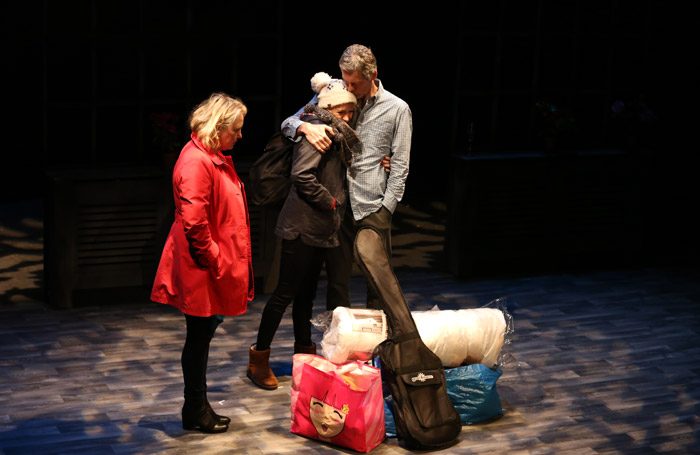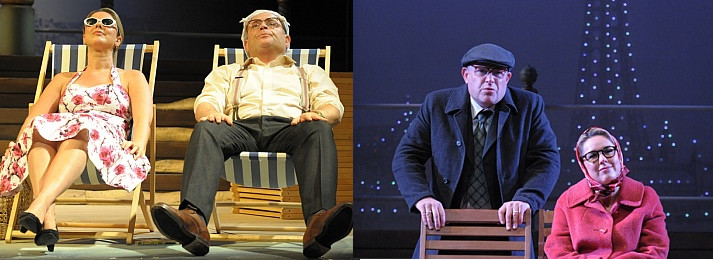Skip to: Sugar Baby, Shakers, Brassed Off
So fringe season is over and it’s back to local plays. I saw three play in September, all bringing stories from outside the area into the north east in different ways: a straight revival, an ambitious update, and a challenging adaptation. The result vary, so let’s see how they do.
Sugar Baby
So we begin with a play at Alphabetti. Although Alphabetti theatre has made the three-week run the norm, it varies where the plays come from. Some are new plays by local artists, but this one is a revival of a play by Welsh playwright Alan Harris. It was also premiered at Paines Plough’s Roundabout at the Edinburgh Fringe in 2017. Having been encouraged to check out what they do in Edinburgh, this was a good opportunity for a catch up.
On the face of it, Sugar Baby could be a thriller. Marc is trying to clear some debts with loan shark Oggy. Lisa also owes Marc money, and is paying her debts by being his sugar baby. Unknown to Oggy, however, Lisa has always has the hots for Marc. That in itself could make a decent thriller. However, the twist to all of this is that 1) it all takes place in the same suburb of Cardiff and 2) everybody in this story seems to have gone to the same school, which just makes it all the more awkward. This balances up the thriller with comedy. The third part to to story, however, is an unexpected poignancy. Marc is trying to pay off his dad’s debts, but it barely registers at the beginning of the play that he has no contact with his estranged mother. When circumstance forces him to come to her for help, there are touching moments in an otherwise madcap about reconnecting with someone you cut out of your life.
The play is a good all-rounder. As well as straddling genres so well, Alan Harris’s writing is sharp and witty, always keeping up the pace, occasionally introducing moments of surrealism, but never one forcing characters to do implausible things for the sake of either plot or jokes. Natasha Haws does a fine job of directing this, and Ben Gettins nails the part of Marc perfectly. I don’t think there was a weak link anywhere amongst the team, but I was particularly impressed with Matt Jamie’s projections on the walls. It wasn’t just the technical skill for doing this, but also the styling way it was done. I don’t know how much of this was the idea of the production and how much was stated in the script, but this is one of the times where simplicity works so well.
There’s just one small irritation. I can’t remember to Alphabetti has reconfigured its seating, but there is a corner with filled in seating. As anyone used to a thrust stage knows, corners with aisles for seating are a good spot to face inwards to the stage, so that you completely have you back to no-one – but unfortunately I was sitting in that corner and spent a lot of time looking at Ben Gettin’s back. But that’s only a small issue. It’s a fun play more than anything challenging, but it’s is a very enjoyable read. Sugar Baby finishes this week and it’s work catching if you can.
Sugar Baby continues until 8th October at Alphabetti Theatre.
Shakers: under new management
Now, this wasn’t quite what I was expecting. Shakers is famous for being the female version of Bouncers, with John Godber this time co-writing the play with his wife, Jane Thornton. However, the focus is quite different. Ralph, Judd, Les and Lucky Eric are quite content to hand around the door of a seedy nightclub looking moderately intimidating, but that’s not an option for cocktail waitress Adele, Mel, Carol and Nicky. They have to be nice to all the customers even though many of them treat the four like shit. The inspiration for the play was the camaraderie that workers in these jobs develop when the going gets tough (something I can vouch for based on conversations I’ve had with people in these jobs for real).
However, the difference is with how the play is updated. Godber tweaks Bouncers every time he produces it, but the story is broadly the same. Jane Thornton makes the point that the lot of these waitresses hasn’t changed much either, which may well be true – however, what has changed is that this is being talked about a lot more. At the time this was written, it passed without comment that bar workers would walk home alone in the early hours – today, that is a hot topic of debate. Shakers bar, however, is stubbornly refusing to move with the times, with managers sodding off before the going gets tough, and no money on door staff – and customers who do not, or will not, think about that these three (the cast cut from four in the original) what they have to put up with.
I’m sold on the idea, there’s clearly a lot to be done with a reboot. What I’m not quite so sold on, however, was doing this as an update rather than a sequel. Some of the things translate well. For example, the group of party girls out on the lash (like Bouncers, the cast play all the parts of the people going in and out), are now a group of teachers on the lash, only to run to a group of their pupils taking pictures of them disgracing themselves. At least you never had to worry about camera phones and the internet in 1984. Other times, however, the updates feel like a bolt-on. There is a discussion of the Ask for Angela posters in the toilets – but nothing comes of that.
Which is why I’m wondering if Godber and Thornton would have been better off doing this as a new play. Keep the play format, keep the shitty conditions, but do a new set of stories to fit around the issues we know today rather than retrofit the old stories. What if someone came to the bar as actually did ask for “Angela”? We’ve already established this bar doesn’t care enough about safety to bother with security – how are Adele, Nicky and Mel meant to confront her possibly violent bad date? It was a good time to choose to revive Shakers and it’s worth catching on tour, but maybe this would be had the most impact as Shakers 2. Next time, perhaps.
Brassed Off
And finally, on to the Gala Theatre’s flagship production for the year. In some ways, this was a safe bet: anything based on the legendary 1996 film ought to be an guaranteed draw, and although the film was set in the Yorkshire coalfield, it could just as easily have taken place in County Durham, hence the logical change of location. In other ways, however, it’s a very ambitious thing to take on: Mark Herman’s script is a very cinematic script with numerous cutscenes impossible to reproduce on stage. There is also the massive logistical challenge of how to include a brass band, which, as you may recall, has a pretty central role in the story. Two colliery bands played Grimethorpe Colliery Band; I saw Fisburn on the night I went, it’s vital for the band to have a decent standard of playing if we’re to believe they’re going to win at the Albert Hall, and they did they job. Even so, putting this all together on stage is a logistical nightmare. Fortunately, the Gala Theatre can call on Conrad Nelson, who has a long track record with Northern Broadsides of making polished productions out of logistical nightmares. This is the sort of script where it’s goes unnoticed when you do things right and sticks out like a sore thumb, so the fact that this all went off without a hitch is a credit to the production.
However – and apologies for putting a hot take here – I am not taken in with Paul Allen’s stage adaptation. This script came two years after the film and has run and run, so he must be doing something right (and his biography of Alan Ayckbourn is excellent). But I’m not convinced Allen’s style of writing is suited to Mark Herman’s style of cinematography; nor am I convinced does it go that well with Conrad Nelson’s strengths as a director. To appreciate how cinematic Mark Herman’s screenplays are, it’s worth seeing both the stage and screen versions of Jim Cartwright’s The Rise and Fall of Little Voice. Both versions are great, but Herman’s screen play of Jim Cartwright’s stage play is a very different experience. Doing it the other way round and changing his script from screen play to stage play isn’t straightforward, because some of the most memorable moments of the film are a single line delivered in a single frame – the union official’s reading out of the ballot result being one that spring to mind. Paul Allen, however, is a much more static play with longer scenes and semi-permanent sets taking up the stage. In addition, the script seems to flesh out chunks of the story that didn’t need fleshing out, and sometimes knocks things out of balance. Andy and Gloria were a believable couple in the film, but in the stage script they spend 90% of their time bickering about pit closure politics and the chemistry is lost.
I know Conrad Nelson (whose previous work I’ve loved) isn’t going to agree with my verdict of the script. He’d previously directed it for the New Vic and wouldn’t have done it again if he didn’t believe in it. There are some touches in the play that I like: the men queuing up to vote in the pit closure ballot making the most important decision of their lives was a good addition, where body language said more than any words. Credit goes to Maddie Hanson for doing what Tara Fitzgerald didn’t and play her own flugelhorn. The Gala’s production does achieve every it set out to do, of bringing a story into County Durham, involving local people who otherwise wouldn’t take part in theatre, and drawing in a good audience, but it’s harder to please someone who loves the original film and carries forward the sky-high expectations. What’s frustrating is that I reckon his usual collaborator and wife Deborah McAndrew could have done an excellent adaptation if her track record of previous adaptations is anything to go by. Probably impossible to go down this route now, not without some massive arguments, but should they ever gown down that route, I’ll be up for it.

 The John Godber Company has been one of the most determined companies to perform on in any way they can, although it’s fair to say they were at a bit of an advantage here. With the Godber family themselves taking on so many roles over the years, it was an easy matter to put on a family event with Sunny Side Up. I would like to have told you about that, but the performances were very popular and sold out quickly. However, not all John Godber performances are family affairs, at to get back into the swing of things this year, they put on one of their largest productions to date at Hull Marina.
The John Godber Company has been one of the most determined companies to perform on in any way they can, although it’s fair to say they were at a bit of an advantage here. With the Godber family themselves taking on so many roles over the years, it was an easy matter to put on a family event with Sunny Side Up. I would like to have told you about that, but the performances were very popular and sold out quickly. However, not all John Godber performances are family affairs, at to get back into the swing of things this year, they put on one of their largest productions to date at Hull Marina.

 John Godber’s career has taken and interesting turn ever since he set up his own “John Godber Company”. After departing Hull Truck in a moderately acrimonious manner, he’s rebuilt bridges very quickly and happily tours there. He’s very supportive of amateur productions of his work when many other playwright are snotty about amateur efforts. But the most interesting development is the emergence of what some call a new “angry” Godber. I’m not sure I’d use the word “angry” myself – but his recent plays speak out on a lot of issues, and not whichever issues are the latest bandwagon, but whichever issues that are important to him. He particularly got my respect for
John Godber’s career has taken and interesting turn ever since he set up his own “John Godber Company”. After departing Hull Truck in a moderately acrimonious manner, he’s rebuilt bridges very quickly and happily tours there. He’s very supportive of amateur productions of his work when many other playwright are snotty about amateur efforts. But the most interesting development is the emergence of what some call a new “angry” Godber. I’m not sure I’d use the word “angry” myself – but his recent plays speak out on a lot of issues, and not whichever issues are the latest bandwagon, but whichever issues that are important to him. He particularly got my respect for 

